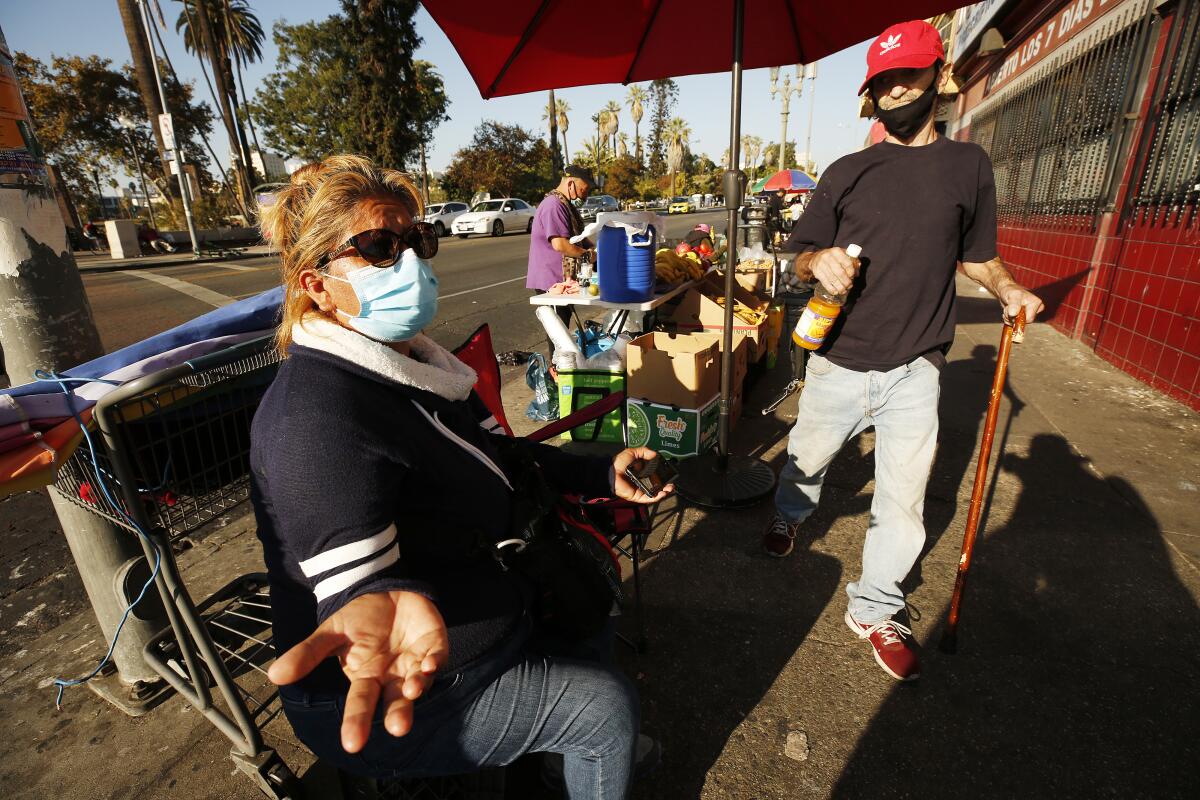Op-Ed: Hands off our taco carts! Small legal changes would protect vendors

- Share via
That street taco you have been craving was supposed to be legal by now. Instead, thousands of sidewalk food vendors in Los Angeles remain unpermitted, denied the dream of entrepreneurialism by laws that undercut food safety principles they claim to protect.
As L.A. haltingly reopens amid the COVID-19 pandemic, officials have relaxed regulations to allow restaurants to serve food outside. But vendors — providing L.A.’s original outdoor dining experience — are denied the same treatment. In this pivotal moment, as many in government work to address inequality worsened by the pandemic, we must prioritize equitable public health standards that promote economic justice. This includes addressing the needs of low-income sidewalk vendors so that they can finally serve your tacos and other iconic street food fare with the full legal protection they, and you, deserve.
We were supposed to have already done this. In 2018, the California Legislature passed Senate Bill 946, requiring cities to stop issuing criminal citations and to regulate, not ban, sidewalk vending. Following along, L.A. repealed its decades-long criminal ban, establishing a permit system to regulate vending locations. These were landmark victories for sidewalk food vendors — but only on paper.
Three years later, workers behind L.A.’s celebrated food carts remain subject to daily fines and harassment for lacking permits. Since 2020, the city has issued only 165 permits to sidewalk food vendors, out of an estimated 10,000 eligible vendors.
A tangled web of city, county and state law is to blame. The city will not issue an operating permit to food vendors until they obtain a county health permit, which itself follows requirements set by the state Retail Food Code. To understand how all these rules fit together, we mapped out every step a vendor has to meet to legally vend in LA. We were shocked by what we found: A system designed to permit vending instead renders it functionally illegal. How?
A critical problem is that permit standards were developed for large food trucks — not small sidewalk vendors. For most food, the rules impose onerous equipment requirements, mandating four separate sink compartments, 20 gallons of water, exhaust ventilation, mechanical refrigeration and large food storage capacity. As a result, the few qualifying carts on the market cost thousands of dollars, and many are simply too heavy to push and too large for sidewalks. To make matters worse, the state prohibits slicing fruit or hot-holding previously prepared food at a sidewalk cart, creating a de facto ban on fruit carts and taco stands.
Ill-designed equipment requirements aren’t the only problem. The law also requires sidewalk vendors to pay for access to a small number of expensive commissaries made for trucks, while underutilized kitchens in community spaces like schools, restaurants and places of worship sit empty. Obtaining a permit requires navigating a head-spinning number of steps, none explained in languages relevant to the immigrant community. Any vendor who can successfully navigate this labyrinth then encounters a shocking price tag. Selling unpackaged food incurs a minimum of $10,000 in startup costs, plus $5,000 in annual fees. For workers earning an average of $15,000 a year, this amounts to a ban.
Instead of helping vendors break down barriers, local officials have created new barriers — in some cases, literally, by erecting chain-link fences to banish vendors from beloved community spaces like Echo Park and the Avenue 26 Night Mart. Instead of finding solutions, officials punish violations with tickets and cart confiscation,
depriving vendors of their livelihood. Raids are often conducted by sheriff’s deputies who have no business enforcing food safety rules.
The good news is that this broken system is fixable in the short term through targeted reform advancing the twin goals of promoting vendor opportunity and protecting public health.
First, the Legislature must change the Retail Food Code to support safe practices already undertaken by vendors: reducing sink requirements to reasonable levels; establishing sensible standards for safe reheating of food; opening licensed home kitchens for food preparation; and removing onerous criminal penalties.
Second, the county Department of Public Health must adapt its administrative practices to support struggling vendors. One easy step forward is to preapprove blueprints for affordable carts.
The county should also authorize underutilized community kitchen spaces for vendors to prepare food and store equipment, enable shared access to auxiliary sink facilities, lower permitting costs and stop bringing armed law enforcement to compliance checks. None of these critical steps requires state action; all can be done by the Department of Public Health now, as part of an ongoing county pilot program to evaluate and design new street vending regulations.
Removing these barriers is good not only for vendors, but also for all Angelenos. Helping vendors succeed will expand healthy food options for consumers, provide economic security for low-income and immigrant workers, and reduce enforcement costs.
We are in a moment when big change is more urgent and achievable than at any other point in our lifetimes. Let’s seize it to finish the work of legalizing sidewalk vending and fulfill the promise of an equitable economy for all L.A. residents.
Scott Cummings is the Robert Henigson professor of legal ethics at the UCLA School of Law. Doug Smith is a supervising senior staff attorney in the Community Development Project at Public Counsel.
More to Read
A cure for the common opinion
Get thought-provoking perspectives with our weekly newsletter.
You may occasionally receive promotional content from the Los Angeles Times.










